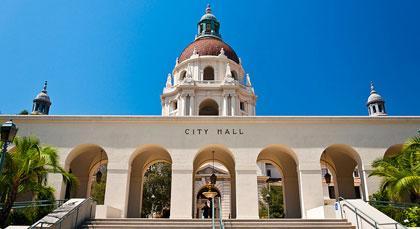Government Ethics
The Markkula Center for Applied Ethics explores Government Ethics issues including campaign ethics, conflicts of interest, gifts to officials, transparency, budgeting, and other topics.
by John Pelissero, Director, Government Ethics and Professor Emeritus of Political Science at Loyola University Chicago
"On taking office, every public servant, elected or appointed, enters into a covenant with the people: that as a public official they will seek to promote the public interest in all political processes and ensure that policy adoption and service provision occur without favoritism or discrimination. Moreover, a public official must not use her or his position for personal gain and should avoid even the appearance of having a conflict of interest. An ethical awareness of the obligation to act in the public interest will normally promote fairness and justice, and advance the common good."

“Voting for Ethics” is a non-partisan, how-to guide for U.S. voters. It will help you identify the hallmarks of an ethical candidate and make a more informed decision -- whether for your local school board or a national election.


This guidebook is designed to help those managing or engaging in political campaigns do so in an ethical manner. It also serves as a valuable resource to voters, helping them identify the hallmarks of an ethical campaign.

A collection of resources designed to support civic education and learning for higher education and high school curriculum.
A democratic society requires an informed citizenry that understands the purpose of democratic government and how the processes of a democracy work, especially voting and elections. Learn more about how the Ethics Center is enhancing the education of young people on civics and ethics.

The city of San Jose’s Mayor Matt Mahan proposed the “Responsibility to Shelter Initiative,” which would penalize homeless individuals who refuse shelter three times in the span of 18 months. There are ethical arguments both for and against it.

Governments must ensure that representative democracy is preserved through the responsible use of AI by the citizens’ representatives.

The headlines this election cycle have been dominated by unprecedented events, it’s no wonder other important political developments have been drowned out, including the steady drip of artificial intelligence-enhanced attempts to influence voters.

The common good would be better served by debates that elevated voters’ confidence in our ability to engage in civil discourse, restoring some of the trust the public has lost in its elected officials.

Five Common Conflicts of Interest in Government and How to Prevent Them
How officials can avoid and prevent even the appearance of acting to benefit their personal and financial interests, at the cost of the public’s interest.
Writing a code of ethics? View samples curated from professional associations and state and local governments.


The Government Ethics Fellowship is open to juniors and seniors with a major or minor in social sciences, humanities, or business.
Fellows work approximately four to five hours per week on projects at the intersection of policy and ethics with Professor John Pelissero, director of government ethics at the Ethics Center.
Are laws always ethical? How have voting rights recently been restricted within the United States? Are state officials abusing their power in unethical ways to change voting regulations?
In this episode of the Wild Beasts podcast, John Pelissero, director of government ethics at the Markkula Center for Applied Ethics discusses voting rights, disinformation, discrimination, and voter suppression.


Browse our commentaries on civic virtue, campaign ethics, lobbying, and current events.

Dive deep into real-life conflicts of interest, whistleblowing, gifts and bribes, and cronyism.

Hear what our staff and fellows are saying about voting, public trust, transparency, and more.

This team of professionals from public, private, and academic sectors collaborates with the Ethics Center to identify and prioritize complex, government-related ethical issues.

John Pelissero, director, government ethics, quoted by Mother Jones.

John Pelissero, director, government ethics, quoted by Raw Story.

John Pelissero, director, government ethics, quoted by The Sacramento Bee.

John Pelissero, director, government ethics, quoted by The 74.
Empowering Democracy: An Ethical Civic Education Project
The Markkula Center for Applied Ethics has developed a curriculum on the ethical value of democracy, especially the duty to participate in voting and elections. The goal of this educational program is to enhance the education of young people on civics and ethics that will expand knowledge, empower democratic participation in our electoral processes, and help restore trust in government. The Empowering Democracy Curriculum can be taught as a special undergraduate course in colleges and universities or in the high school curricula.

